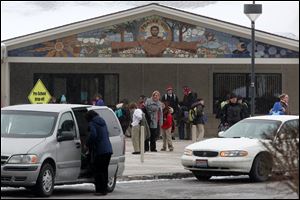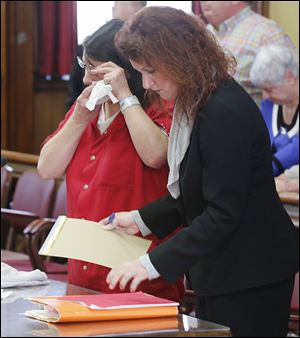
Five Things You Might Have Missed: 3-17
Top stories from this weekend's editions of The Blade
3/17/2014
Cleveland, Dayton, and Columbus, along with the broader Ohio Municipal League, have come to Toledo’s defense against a Kentucky man’s challenge to the city’s red-light cameras in the Ohio Supreme Court.
THE BLADE
Buy This Image

Abraham Sallock sits with Manira Saide-Sallock, holding her father’s rababa, a stringed instrument, in their Oregon home. Ms. Saide-Sallock’s father, Mohammed, lived in the Little Syria district in the 1940s.
1. Middle Easterners assert their own unique identity
Manira Saide-Sallock, 74, remembers when her father, Mohammed Saide, and Shadid Ya’qub, the father of the late actor Danny Thomas, would sit in their backyard in Toledo’s Vistula neighborhood and sing the Aataba, a melancholy, improvised ode sung in Arabic.
Her father played the rababa, a wooden stringed instrument, while he and Mr. Ya’qub exchanged songs.
The streets of what was known as Little Syria, in the 1940s, were lined with families from the Middle East. The Sodds. The Warrs. The Haddads.
Today, little is left of the Arab-American community that called the North Toledo neighborhood home. READ MORE

Lisa Tury stocks shelves at Food Town in Monroe where she's been an employee for five years. Co-owner Ronnie Dallo, like other businessmen, worry about a wage increase’s effect on business, but he also cares about his 29 workers.
2. Raising minimum wages gets maximum play in Michigan
The group behind a ballot effort to significantly raise Michigan’s minimum wage believes public opinion is strongly on their side, even as many within the state’s business community fight against the effort.
“We’re pretty confident if we go to the ballot we’re going to win,” said Frank Houston of the Raise Michigan ballot committee.
The coalition is collecting signatures for a ballot initiative that would increase the state’s minimum wage from the current $7.40 per hour to $10.10 per starting in 2017, and tie future increases to the Consumer Price Index.
More controversially, the proposal also would raise the minimum wage of tipped employees — now $2.65 an hour — by 85 cents each year until they’re on par with regular hourly workers.
Backers say a minimum wage of $10.10 would give a raise to nearly 1 million Michigan workers, pulling many of them out of poverty and off government assistance programs. Supporters also argue it would boost the economy in Michigan, where the 7.8 percent unemployment rate remains more than a full percentage point higher than the rate in the rest of the United States. READ MORE

Parents of students at Franciscan Academy have scrambled to find new schools for their children after Lourdes University announced the K-8 school will close at the end of this school year.
3. Parents at Franciscan Academy work together to find new schools for children
Many parents of the 172 students at the Franciscan Academy in Sylvania have band together to find new schools for their children.
The Catholic academy, at 5335 Silica Dr., is run by Lourdes University with a preschool and K-8 grades, but is slated to close at the end of this school year. The shutdown was announced in January, when Lourdes said it could not keep financially supporting keeping the school open.
Matt and Lisa Logan of Toledo looked at five area private schools before deciding to send their two children to All Saints Catholic School in Rossford. Their children, Clare, 9, and Madeline, 7, now attend the academy. Mr. Logan said the search for a new school was an “arduous task.”
“The schools we visited had very close characteristics to the Franciscan Academy, including an intimate setting,” and an excellent academic reputation, he said. READ MORE

Defendant Candis Sherman with her attorney, Amber VanGunten, cries after she is sentenced in Fulton County to 10 years in prison for the attempted aggravated murder of her son, Logan, then 15.
4. Mother gets 10 years for attempt to kill son
Candis Sherman said she was planning to kill herself the morning she walked into her 15-year-old son’s bedroom, pointed a 38-caliber handgun at him, and fired five rounds.
Just before she was sentenced Friday to 10 years in prison by Fulton County Common Pleas Judge James Barber, Sherman, 57, told the court her estranged husband had died just a few weeks earlier. They had no health or life insurance, she said, and she feared she would lose her home.
“I was feeling totally overwhelmed and incapable of handling all of this,” Sherman said between tears. “I just wanted to take my own life, but all I could think about was where that would leave my son and what it would do to him.
“I know this probably will not make sense, but my choice to attempt to take his life was not done as a malicious act,” she said. “My thinking at that point was to spare him additional pain of losing another parent. I believed that we would be at a much better place.”
The rural Delta woman had pleaded guilty in January to attempted aggravated murder with a firearms specification for the July 21 shooting of Logan Sherman. READ MORE

Cleveland, Dayton, and Columbus, along with the broader Ohio Municipal League, have come to Toledo’s defense against a Kentucky man’s challenge to the city’s red-light cameras in the Ohio Supreme Court.
5. State lawmakers, liberties groups oppose red-light, speed cameras
Two constitutional-rights organizations and 28 state lawmakers have sided with a Kentucky man in his Ohio Supreme Court challenge of Toledo’s red-light and speed-enforcement cameras, arguing that the city’s law makes police both judge and prosecution.
Meanwhile, Cleveland, Dayton, and Columbus, along with the broader Ohio Municipal League, have come to Toledo’s defense, knowing that if one city’s program falls, their own likely will follow. They argue that their home-rule authority is in danger.
The American Civil Liberties Union of Ohio, in a brief supporting Bradley L. Walker’s challenge, argues that Toledo’s ordinance wrongly puts appeals of citations in the hands of an administrative arm of Toledo police and provides an arbitrary deadline for those cited to pay their civil fines or make the case they weren’t driving the car at the time.
“An even stronger case for safeguards exists in the present case because the city government is incented not to provide safeguards, not just because of the administrative cost, but because the government benefits from the very lack of safeguards, since it collects and retains some of whatever penalties it may assess,” the brief filed by Freda J. Levenson for the ACLU said. READ MORE